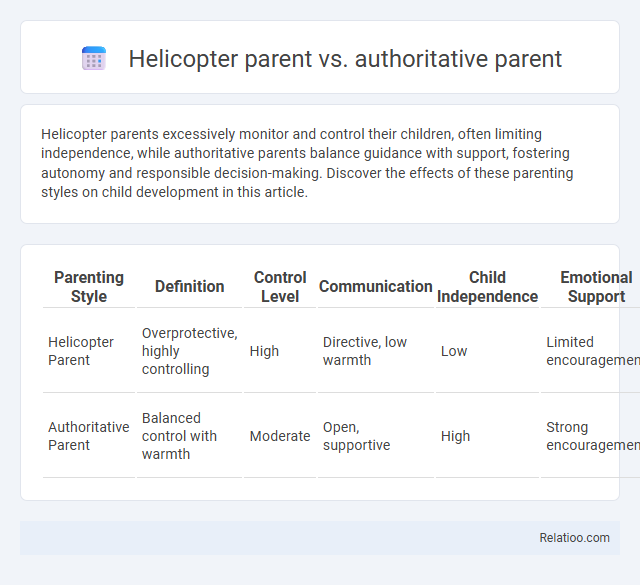Helicopter parents excessively monitor and control their children, often limiting independence, while authoritative parents balance guidance with support, fostering autonomy and responsible decision-making. Discover the effects of these parenting styles on child development in this article.
Table of Comparison
| Parenting Style | Definition | Control Level | Communication | Child Independence | Emotional Support | Outcome on Child |
|---|---|---|---|---|---|---|
| Helicopter Parent | Overprotective, highly controlling | High | Directive, low warmth | Low | Limited encouragement | Dependency, low problem-solving skills |
| Authoritative Parent | Balanced control with warmth | Moderate | Open, supportive | High | Strong encouragement | Independent, confident, socially competent |
Understanding Parenting Styles: Helicopter vs Authoritative
Helicopter parents exhibit overprotective behavior, frequently intervening in their children's lives to prevent failure, whereas authoritative parents balance responsiveness with clear boundaries and encourage independence. Understanding these parenting styles reveals that authoritative parenting promotes healthier emotional development and self-discipline, while helicopter parenting often leads to increased anxiety and reduced problem-solving skills in children. Research indicates authoritative parenting correlates with higher academic performance and social competence compared to the controlling, anxious tendencies associated with helicopter parenting.
Defining Helicopter Parenting Characteristics
Helicopter parenting is defined by an overinvolvement in a child's life, where parents closely monitor and control every aspect of their child's experiences to prevent failure or disappointment. This style contrasts with authoritative parenting, which balances high expectations with support and autonomy, encouraging independence while maintaining clear boundaries. Recognizing the distinct characteristics of helicopter parenting can help You understand the impact of excessive control on Your child's development and foster healthier parent-child dynamics.
Key Traits of Authoritative Parenting
Authoritative parenting is characterized by high responsiveness and high demands, promoting open communication, warmth, and clear boundaries that support your child's independence and emotional growth. Unlike helicopter parents who closely monitor every detail and authoritarian parents who enforce strict rules without feedback, authoritative parents balance structure with empathy, encouraging decision-making and self-discipline. This approach fosters confidence, social competence, and resilience in children, making it a widely recommended parenting style.
Emotional Impact on Children
Helicopter parents often cause increased anxiety and reduced independence in children due to overprotection and constant oversight. Authoritative parents promote emotional resilience and self-regulation by balancing warmth with clear boundaries, fostering healthier emotional development. Neglectful parents negatively impact children's emotional wellbeing, frequently leading to feelings of insecurity and low self-esteem.
Academic Outcomes: A Comparative Analysis
Helicopter parents often exhibit high levels of control and involvement, which can lead to increased stress and dependence in students, negatively impacting academic outcomes. In contrast, authoritative parents balance support and autonomy, fostering self-discipline, motivation, and higher academic achievement. Research indicates that children of authoritative parents consistently outperform those with helicopter or permissive parents in standardized tests and overall school performance.
Social Skills Development in Different Parenting Styles
Helicopter parenting often hinders social skills development by overcontrolling interactions, limiting Your child's ability to navigate social challenges independently. Authoritative parenting fosters stronger social skills through balanced support and clear expectations, promoting empathy, communication, and problem-solving in diverse social settings. In contrast, neglectful parenting typically results in poor social competence due to lack of guidance and emotional connection.
Independence and Decision-Making Skills
Helicopter parents often undermine your child's independence by over-involvement and controlling decision-making, which may hinder the development of self-reliance and problem-solving skills. Authoritative parents encourage independence through supportive guidance and clear boundaries, fostering strong decision-making abilities and confidence in your child's judgments. In contrast, permissive parents may allow excessive freedom without adequate structure, potentially leading to poor decision-making and a lack of accountability.
Long-term Psychological Effects
Helicopter parents, characterized by excessive involvement and control, often contribute to long-term anxiety and reduced self-efficacy in children. Authoritative parents, who balance high responsiveness with appropriate demands, tend to foster better emotional regulation, social skills, and resilience throughout development. In contrast, neglectful parenting, marked by low responsiveness and low control, frequently results in attachment issues, poor academic performance, and increased risk of mental health disorders over time.
Expert Opinions on Effective Parenting
Expert opinions emphasize that authoritative parenting, characterized by balanced responsiveness and clear boundaries, often leads to the most positive child outcomes compared to helicopter parenting, which is marked by excessive control and over-involvement. Research indicates that authoritative parents foster independence and emotional regulation, while helicopter parents can inadvertently hinder your child's ability to develop problem-solving skills. Experts recommend adopting an authoritative style to promote resilience, self-confidence, and social competence in children.
Choosing the Best Approach for Your Family
Choosing the best parenting style involves evaluating the unique needs of your child and family dynamics, comparing Helicopter, Authoritative, and Permissive approaches. The Helicopter parent tends to be overly involved and controlling, potentially hindering independence, while the Authoritative parent balances high expectations with support, fostering responsibility and emotional growth. Permissive parents offer warmth and freedom but may lack consistent discipline, so prioritizing an Authoritative approach often results in healthier child development and family harmony.

Infographic: Helicopter parent vs Authoritative parent
 relatioo.com
relatioo.com